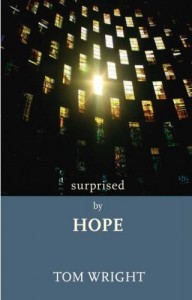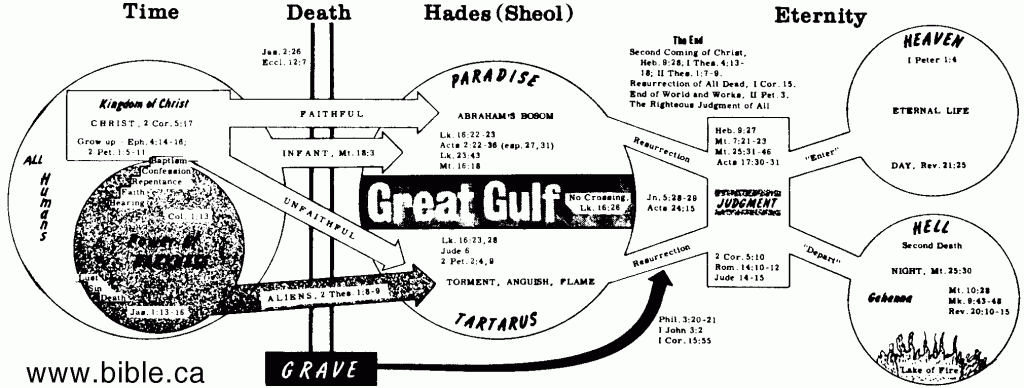 I used to think it was my own little heresy – that the gospel was all about the Lordship of Christ and the fulfillment of his Kingdom here on earth when he returns, more than any possibility of being raptured into an ethereal eternity. My “heresy” has found a harbour. Tom Wright’s Surprised by Hope unpacks an eschatology that brings forth the foundation of the biblical narrative. Not only is it hermeneutical framework changer (or strengthener) but completes the circle by dealing with the putting of gospel into practice.
I used to think it was my own little heresy – that the gospel was all about the Lordship of Christ and the fulfillment of his Kingdom here on earth when he returns, more than any possibility of being raptured into an ethereal eternity. My “heresy” has found a harbour. Tom Wright’s Surprised by Hope unpacks an eschatology that brings forth the foundation of the biblical narrative. Not only is it hermeneutical framework changer (or strengthener) but completes the circle by dealing with the putting of gospel into practice.
The book is quite simple in essence. Wright seeks to answer two questions: “First, what is the ultimate Christian hope? Second, what hope is there for change, rescue, transformation, new possibilities within the world in the present?” (Page 5). And he insists that these questions be asked together, for the Christian hope is not about escaping an evil creation, but about “God’s new creation.. that has already come to life in Jesus of Nazareth.” (Page 5)
“I find that to many – not least many Christians – all this comes as a surprise: both that the Christian hope is surprisingly different from what they had assumed, and that this same hope offers a coherent and energizing basis for work in today’s world’ (Page 5)
Wright then proceeds, to unpack these two issues – the Christian hope, and it’s application.
To the first issue he brings his skill as New Testament scholar and general theologian to bear in a knowledgeable and astute way. His touchstone is the resurrrection and ascension of Jesus, a topic that is poorly handled (if considered at all) in many of the systematic theologies I’ve read. The historicity of Christ’s resurrection is a deliberately aberrational impact of God’s purposes into the world. People simply do not rise from the dead, so that fact this this man has inaugurates something profound. First, it places Jesus higher than all – as the one in whom the Kingdom of God is inaugurated he is Lord of all. And, secondly, upon his return, as the early Christians cry Maranatha!…
“They believed that God was going to do for the whole cosmos what he had done for Jesus at Easter.” (Page 104)
Before he gets to the practical implications Wright unpacks the theological ones. He sets this expression of the gospel against insidious platonism and an assumed dualism that is prevalent in liturgical and spiritual language. I particularly enjoyed how he pulls apart some of our hymnody.
“While we’re on Christian carols, consider ‘Away in a manger’, which prays, ‘and fit us for heaven, to live with thee there.’ No resurrection; no new creation; no marriage of heaven and earth. And when we find in the hymn book the blatant romantic nature-religion and universalims of Paul Gerhardt…
But when life’s day is over
Shall death’s fair night discover
Death in the New Testament is never a ‘fair night’. It is an enemy, conquered by Jesus but still awaiting its final defeat.”
There are theological corollaries to his framework, and he also unpacks these. It could be here that some controversy might lie for some, although it needn’t for I think he draws a line between what is necessary and what is speculative.
Some examples of his thinking includes the necessity of an intermediate state of paradise ahead of the coming of Christ – which means the many rooms prepared by Jesus for his disciples (John 14) are temporary. He also looks at judgement and justification. His view of hell, rather nicely, is not annihilationist, but somewhat Narnian, where hell is for “beings that once were human but now are not, creatures that have ceased to bear the divine image at all.” (Page 195)
One aspect I need to put some more thought into is the notion that the creation of Genesis, while definitely good, is not necessary complete. Rather, creation itself is eschatological (crf. Romans 8), designed as a vessel to receive the fullness of God himself so that the glory of the Lord covers the earth as the waters cover the sea.
“It looks as though God intends to flood the universe with himself; as though the universe, the entire cosmos, was designed as a receptacle for his love. We might even suggest, as part of a Christian aesthetic, that the world is beautiful, not just because it hauntingly reminds us of its creator, but because it is pointing forwards: it is designed to be filled, flooded, drenched in God; as a chalice is beautiful not least because of what we know it is designed to contain…
The world is created good but incomplete. One day, when all forces of rebellion have been defeated, and the creation responds freely and gladly to the love of its creator, God will fill it with himself, so that it will both remain an independent being, other than God, and also will be flooded with God’s own life.” (Pages 113-114)
The key value of this book however lies in Wright’s attempt to complete the circle from theology to practicality – the intertwining of gospel with mission. 1 Corinthians 15 is a key passage as Wright engages with Paul’s vision of our future in the resurrection and reflects on Paul’s application of this hope: “Therefore, my beloved ones, be steadfast, immovable, always abounding in the work of the Lord, because you know that in the Lord your labour is not in vain.”
“The point of the resurrection, as Paul has been arguing throughout the letter, is that the present bodily life is not valueless just because it will die. God will raise it to new life. What you do with your body in the present matters, because God has a great future in store for it… What you do in the present – by painting, preaching, singing, sewing, praying, teaching, building hospitals, digging wells, campaigning for justice, writing poems, caring for the needy, loving your neighbour as yourself – all these things will last into God’s future. They are not simply ways of making the present life a little less beastly, a little more bearable, until the day when we live it behind altogether… They are part of what we may call building for God’s kingdom.” (Page 205)
The basic sense is knowing the Kingdom of God in part here and now what we will know in fullness when Jesus returns. It’s a life that prays “Your kingdom come on earth as it is in heaven” and builds for that kingdom. Wright unpacks kingdom tasks around the categories of working for justice, beauty and evangelism (chapter 13).
When talking about mission it is hard to get the balance right between our obligation and the sovereign work of God. I like Wrights’ God builds the kingdom, we build for the kingdom phrasing. But I’m not sure whether describing our missions as “seeking… to implement the achievement of Jesus and his resurrection” (Page 245) is helpful. Jesus “achieves” and we “implement” – I’m not sure if this hits the balance. Perhaps it’s my cynicism – many of the examples Wright gives of mission in action seem simply too bureaucratic. Part of me is discontent with welfare programs or even “Truth and Reconciliation Commissions” as an outworking of the gospel. They seem doable without Jesus and thus devoid of power. I want to see miracles as the Kingdom of God comes near to those who are bound by sin and the world, just as it did for Jesus. Perhaps this is eschatological angst on my part.
I did appreciate Wright’s last two chapters, however, where he goes where my heart always goes – the reshaping of the church for mission. The message for a church which has lost its hope is “It’s time to wake up!… Come alive to the real world, the world where Jesus is Lord, the world into which your baptism brings you, the world you claim to belong to when you say in the creed that Jesus is Lord and that God raised him from the dead.” (Page 265) Such a message can and must reinvigorate our worship, our prayer, our attitude towards life.
In all this Wright has let down a bucket into the depths of the gospel water from which I have not drunk for a long time. The bucket is imperfect for sure. But the water is oh so sweet.




